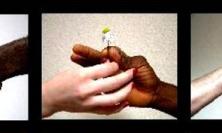Anxiety is an all-too-common affliction in modern Britain. As politics has failed to engage meaningfully with anxiety and its roots, other techniques for addressing it have developed, including the recently popular ‘mindfulness’. Rosemary Boyle brings a Christian perspective to mindful practice and asks, as General Election campaigning gets underway, what a political mindfulness might achieve.
‘Mindfulness, sometimes also called “present-centredness”, can help us enjoy the world more and understand ourselves better.’ This advice comes from the NHS patient leaflet on 'Mindfulness for mental wellbeing'. Pioneered in this country by Mark Williams[i], mindfulness is said to be as effective as medication for the treatment of depression and, accordingly, is recommended by the UK's National Institute of Clinical Excellence. It is also recommended for people who are not depressed but are suffering from anxiety or struggling to keep up with the constant demands of the modern world. Mindfulness has enjoyed extensive media coverage and even claims David Cameron as one of its advocates.
Mindfulness
What is mindfulness? In summary it teaches some simple practices as a therapeutic technique. These help the practitioner to focus awareness on the present moment, to be alert to physical signs of stress and to acknowledge and accept (with some degree of calmness) feelings, thoughts and bodily sensations as events rather than definitions of reality or oneself. Savouring the present moment and bringing our imaginations and memories to bear are the key themes. The reason it strikes such a strong chord is suggested in the blurb for Paul Gilbert’s The Compassionate Mind: ‘In societies that encourage us to compete with each other... research has found that developing kindness and compassion for ourselves and each other... promotes physical and mental health.’
Why has mindfulness come to the fore now? Gilbert identifies the contemporary mindset out of which the need for mindfulness has arisen:
Why are all our advances in medicine and our ability to travel the world, nip down to the local supermarket for any number of things to eat, have the most fantastic flat-screen TV, why are these not making us wonderfully happy as individuals?.... We are caught up in a culture driven by the business model and the need for profit not by a human welfare or well being model.
It seems that the recent popularity of mindfulness is due to many people experiencing modern life as threateningly stressful. However, treating symptoms does not treat the underlying causes and those are, in the end, political.
The political roots of anxiety
For most of us, stress first becomes obvious in the family. The last 30 years have seen big changes in family life. In the mid-80s I was among the first women in my generation who had children and remained in the workforce. I have been lucky to be able to work part-time ever since while bringing up four children. I realised, though, from an early stage, that big change was afoot as women rapidly went full-time into the workplace; house prices inevitably doubled and, as a result, working part-time or not at all became economic impossibilities. Meanwhile the huge amount of voluntary work done by women disappeared, just as the state asked for more free help (sitting on governing bodies, contributing to charity, etc.) and the charity sector expanded and wanted more bodies and more money.
For too long, feminism had no interest in children. This was clearly a ridiculous position. Getting things right for women and children is a good method for getting things right for everyone. Political responses so far to the question of what role women should play in society, and how there could be more open and equal employment opportunities for women, have concentrated mainly on getting women into the workplace. However, they are then generally stuck at lower pay levels than men and there has been no accompanying provision of high quality, affordable childcare. Rather than being treated as a private affair, as they had been previously, children became invisible, things which must not be allowed to get in the way of work. Google and Facebook's offer to freeze their female employees’ eggs is simply a logical outcome. What we do give to children is stuff, not time; and what free time and energy they do have is filled up in line with the demands of the global market, which trains everyone from an early age to become consumers and flexible units of work, not people.
The bursts of globalisation after the end of the Second World War and Cold War transformed material lives not only in North America and Western Europe. They brought to the economic banquet countries that had previously been known for the masses of their poor people. But much stress comes from the competition faced by those working and seeking work in richer countries, as the poorer economies climb up the global ladder. As we are now realising, these bursts of global change had a price: the world of competition leaves no corner untouched. Old political fault lines re-asserted themselves and the idea that the world was limited, and that people had limits, got lost in the frenzy. The failure to recognise these limits, which are becoming increasingly apparent, was a failure of politics. We enjoyed the party with no thoughts for the hangover, which is now upon us.
The current political answers on offer seem to be to compete harder and to show less solidarity. As Janan Ganesh remarked in the Financial Times, unscrupulous politicians now peddle snake oil to the vulnerable – fantasy solutions which do not address the real problems of globalisation's victims in richer as well as poor countries. The global and individual pressures cannot be addressed by exhortations to do more, to be more British or ‘get our country back’, but only by the hard politics of working out how to share things out so everyone can survive. And that is a global question.
A failure of imagination
While politics has stalled, increasingly stuck in national silos that come together only in emergencies to prop up the global market, the upsurge in mental health problems in richer countries has prompted psychologists and psychiatrists over the last 30 years to research the human brain and what might make for human flourishing. This has led to the advent of mindfulness and compassionate mind therapies, among others. What do these ideas tell us about the failure of politics and political imagination, and about what needs to be addressed most fundamentally?
When scientific accounts, such as that of compassionate mindfulness, take a more philosophical turn, Christianity and politics tend to get a bad press: 'Science is the way to a more compassionate world’; ‘It is clear that many who claim to be followers of Jesus have the opposite values’; ‘The philosophy of building societies for our “welfare” is now all but gone’; ‘There is a depressing shift away from “quality of life” politics’.[ii] This should give us pause for thought about the need for more creative thinking in both these spheres.
Christians should be known as bearers of compassion. We know the Lord ‘whose presence is balm’. We understand the sacrament of the present moment, the importance of imagination and the sustenance of memory, which is the Holy Spirit. We know we should not look for victims on whom to unload our fears. But in those parts of the world where there is enough to eat and access to that wide variety of consumer pleasures to which Paul Gilbert referred, it is striking that Buddhism, for example, on which compassionate mindfulness in particular draws heavily, seems to have more appeal in what might seem a post-Christian society. How is the Christian message now so widely unappealing in the telling? It is, after all, the message of the incarnate Son of God, for whom each person is uniquely and irreplaceably loveable, whose compassion was evident, who accepted human suffering and the consequences of human violence and transformed it, and who told his followers to do likewise.
Christian mindfulness?
There is a clear challenge to us to convey the Good News. How are we to do so in a culture which looks to techniques such as mindfulness? Are Christians to be competitors, users, or just onlookers of mindfulness? Can there even be a Christian approach to mindfulness therapies given their Buddhist inspiration? And what might these therapies tell us about how to approach the distress of the contemporary world? These are big questions, which need bigger answers than I can give. But let me make a start by telling you what I have learnt from mindfulness.
First, I now know that if I want or need to be calmer, I need to make space in my head, by stopping during each day and just listening to and looking at the world around me. Secondly, it is possible not to be trapped by the mental treadmill, not to see myself simply as the sum of my thoughts and immediate feelings but to accept them as part of my changing landscape, to be inhabited moment by moment. I have learnt how powerful it is to pay attention to and acknowledge my and others’ feelings, in particular without having or needing to produce a ‘fix’ to a problem.
Mindfulness precisely is not offered as a religious meditation but as a therapeutic technique. When I tried to take forward mindfulness into a more explicit, mantra-based Christian meditation, it didn’t work for me. But as a result of what I had learnt from mindfulness, I learnt to be gentle with my straying thoughts during prayer, rather than discouraged, to simply focus my attention back on breathing in and out. I found it easier to be gentler with myself and to pray silently and more fruitfully than before; the words of the psalms from the Office pop up naturally, as do the concerns I need to share with the Lord. The main difference for me between mindfulness and silent Christian prayer is perhaps that mindfulness tends towards emptying the mind or emptying it out into a compassionate stance to the world. Christian meditation by contrast is about being still and listening in order to welcome a presence.
So can mindfulness help us, as Christians, to be Christ’s loving ear to our brothers and sisters? Well of course, like anything else, it can be used only for self-care. Or it can help us to help others: to pause and listen, and in the silence find and become bearers of comfort and compassion, which ultimately is the work of the Holy Spirit. We must consider that a Christian take on mindfulness, like prayer, would not be about removing oneself from worldly life, but should be grounded in the present: ‘finding God in all things’, hearing and taking up the cries of the poor. The Church and individual Christians must take their faith in their hearts and mouths and be ready to speak truth to power or unfashionable truths to neighbours, friends and politicians, in defence of the poor. In doing so, they must join forces with all who understand the need for compassion in this increasingly fundamentalist world.
Political mindfulness
So what might we be saying to politicians as we approach the next election, aware of the damage that anxiety causes and costs to families and individuals? Politicians seem unsure where to go. National politicians are reluctant to embrace supra-national answers to supra-national problems. There has been a political failure to understand and address the downsides of the consumer revolution of the 20th century; or to take notice of the fact that we are all now producers as well consumers, or of the dissolving effect on national identity of global commerce and dissipation of resources. Everyone who votes both consumes and produces; the political question is what is the relation between our roles as producers and consumers, how are they to be balanced? People do not feel they are agents in a political system. We only feel ourselves to be victims. There are lots of angry feelings and confusion out there. The likely but unspoken truth is that these problems are no longer susceptible to national answers.
Recognising ourselves as... consumer-producers we recognise not only our own finitude but that of the world we inhabit... we have to work out among ourselves how we are to live in it together or we shall die in it separately. [iii]
Moreover we have to find means also to take civilised care of those who cannot or can no longer produce and those who are excluded from the chance to work and create a home, for whatever reason.
Perhaps there could be a new political ‘mindfulness’. This might entail acknowledging and attending to people’s feelings , particularly fears – not stoking them either by repressing fears or working them up into irrational panic; and most of all by not interpreting a fearful feeling as a trigger for action. How you interpret and help people to understand their anxieties and most importantly what you do about those feelings is a moral and practical question. Playing on people’s fears is not and should not be used as a way of getting elected.
Rosemary Boyle has four children, lives and works in Cambridge as a lawyer, and helped run a parish youth group for twelve years.
[i] Professor Mark Williams and Dr Danny Penman, Mindfulness. A Practical Guide to finding peace in a frantic world. (Mark Williams is Professor of Clinical Psychology at the University of Oxford and an Anglican priest.)
[ii] Paul Gilbert, The Compassionate Mind
[iii] Nicholas Boyle, Who Are We Now?: Christian Humanism and the Global Market from Hegel to Heaney (1998).






